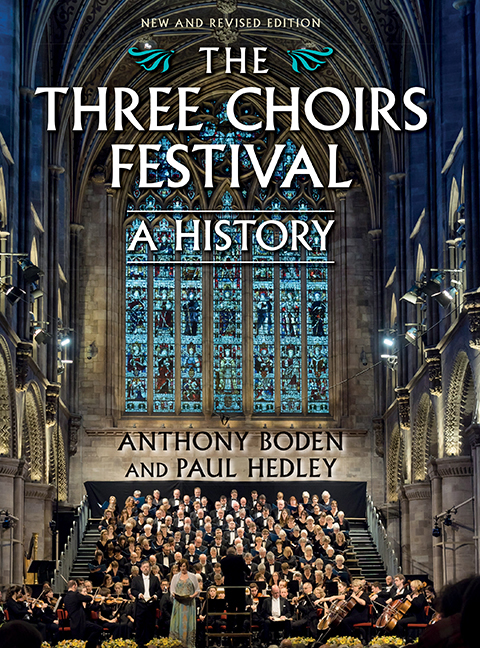Book contents
- Frontmatter
- Contents
- List of Illustrations
- Preface
- Acknowledgements
- List of Abbreviations
- List of Cathedral Organists
- 1 Origins
- 2 A Fortuitous and Friendly Proposal
- 3 A Numerous Appearance of Gentry
- 4 ‘The Musick of my Admiration Handel’
- 5 The Gentlemen and the Players
- 6 Avoiding Shipwreck
- 7 Prima voce
- 8 Favourites and Flops
- 9 Sacred and Profane
- 10 Froissart
- 11 The Unreasonable Man
- 12 The Dream
- 13 Beyond these Voices
- 14 An Essentially English Institution
- 15 The Elgar Festivals
- 16 Dona nobis pacem
- 17 Recovery
- 18 Association
- 19 A New Epoch
- 20 Jubilee
- 21 Theme with Variations
- 22 Houses of the Mind
- 23 ‘A Gold-Plated Orchestra’
- 24 A New Millennium
- 25 Reorganisation
- 26 An Invitation to the Palace
- Appendix Three Choirs Festival Timeline
- Select Bibliography
- Index
- Plate section
Appendix - Three Choirs Festival Timeline
Published online by Cambridge University Press: 11 August 2017
- Frontmatter
- Contents
- List of Illustrations
- Preface
- Acknowledgements
- List of Abbreviations
- List of Cathedral Organists
- 1 Origins
- 2 A Fortuitous and Friendly Proposal
- 3 A Numerous Appearance of Gentry
- 4 ‘The Musick of my Admiration Handel’
- 5 The Gentlemen and the Players
- 6 Avoiding Shipwreck
- 7 Prima voce
- 8 Favourites and Flops
- 9 Sacred and Profane
- 10 Froissart
- 11 The Unreasonable Man
- 12 The Dream
- 13 Beyond these Voices
- 14 An Essentially English Institution
- 15 The Elgar Festivals
- 16 Dona nobis pacem
- 17 Recovery
- 18 Association
- 19 A New Epoch
- 20 Jubilee
- 21 Theme with Variations
- 22 Houses of the Mind
- 23 ‘A Gold-Plated Orchestra’
- 24 A New Millennium
- 25 Reorganisation
- 26 An Invitation to the Palace
- Appendix Three Choirs Festival Timeline
- Select Bibliography
- Index
- Plate section
Summary
EIGHTEENTH CENTURY
1709 Early evidence of ‘friendship and fraternity’ was shown in 1709 when Henry Hall, the Organist of Hereford Cathedral, and his counterpart at Gloucester, William Hine, collaborated in the composition of a morning service, ‘Hall and Hine in E flat’, possibly for a joint celebration at Worcester in 1710. The Te Deum is by Hall, the Jubilate by Hine.
1715(G) The year from which the Music Meetings are counted. It is believed that the annual gatherings were fully established by 1715, albeit that the earliest actually recorded Meeting was held in 1719(W). Wars have interrupted the continuity of the Festival twice, from 1914 to 1920, and from 1939 to 1945. Until the late 1750s only music for services was permitted in the cathedrals, where the Te Deum and Jubilate in D of Purcell, for example, was sung regularly for almost forty years from the inception of the Meetings. Other concerts, including oratorio performances, were held in various secular venues. Even Messiah was not at first admitted within the cathedrals.
1724(G) Thomas Bisse successfully proposed that the Music Meetings should be held for a charitable purpose, i.e. for the benefit of the orphans (later ‘the widows and orphans’) of the poorer clergy of the three dioceses. This remained the principle raison d'etre for the Festival Charity until 1986.
1731(W) William Hayes, a pupil of William Hine at Gloucester and an ardent Handelian, was Organist at Worcester until 1734 but did not conduct at the Meetings during those years. Handel became the dominant composer in the programmes, which from 1733 featured ‘the most eminent performers from the metropolis’. Hayes went on to become Professor of Music at Oxford and to build a national reputation as composer, conductor, singer and organist, appearing at Three Choirs many times in the 1750s and 1760s.
- Type
- Chapter
- Information
- The Three Choirs Festival: A HistoryNew and Revised Edition, pp. 433 - 444Publisher: Boydell & BrewerPrint publication year: 2017

